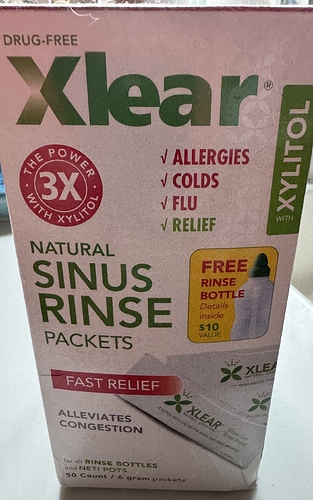I use a nasal saline in my netti pot thingy and they have salt packets that usually come with it. Well recently an allergist told me to get this new kind that has the salt saline plus xylitol. I don’t really swallow or digest any, but of course taste the sweetness. I just rinse my sinuses with it. But holy cowzas, it’s wayyyyy more effective than just the typical salt saline. Sometimes hours later I’ll bend over to get a pan out of the cupboard or something like that and the minute my head is down my sinuses drain like a faucet handle on the side of my nose was switched on. I have to run quickly to get a Kleenex, then wash the floor where I was.  That would happen with the regular salt rinse but only right after doing it over the sink. Never later. But something about xylitol clears the sinuses wayyy better and keeps on clearing. Xylitol: the a jack of all trades.
That would happen with the regular salt rinse but only right after doing it over the sink. Never later. But something about xylitol clears the sinuses wayyy better and keeps on clearing. Xylitol: the a jack of all trades. 
Artificial sweeteners: not so good 🙄
They make a commercial saline sinus rinse that has xylitol in it. Is supposed to be very effective but this is not something I am prone to but will suggest it to one of my kids who is prone to congestion. Thank you for reminding me about it. The kid gets migraines and is always slightly congested, probably will not make a difference but I am always willing to try anything
Yes this is the one you speak of that my allergist gave to me. It really does work, but your kid will want to have Kleenex in their pockets for drops that happen without effort. It’s that good. Lol
As I recall, the amount of xylitol used in these studies to get the platelet aggregation was about 30 gr. Same for erythritol. Being a natural substance, I don’t have too much concern with using xylitol - I certainly don’t consume anywhere near 30 gr of it, when I do consume it, and as a bonus when this study came out, my source for it put it on clearance, and I was able to buy it for about $3.33/lb!!
These days I am actually using erythritol more, and it is my understanding that it is less absorbed by the body - leaving a good amount for the gut flora. Anyway, I eat probably 2-3 gr of it per day, so I am not concerned about it - nothing like the amounts used in these studies… and now these studies have been redone slightly more stringently in an apparent attempt to redeem themselves, but I still am not satisfied that they show anything relevant. Does drawing the blood and torturing it with an agonist in a petri dish resulting in finding aggregated platelets really reflect real life? It is not like they found these aggregated platelets in the bloodstream. It is my suspicion that someone doesn’t want erythritol to become GRAS.
Erythritol is actually made by the body in tiny amounts, but can become more elevated in metabolically unhealthy people. So, in healthy people, erythritol may get cleared quickly, and platelet aggregation may be negligible or non-existant. I am more interested in a study which examines this. In short as is, these studies seem kind of tortured, and I am cautious about drawing any panicked conclusion about them - I question why they seem so tortured.

